Switch to the mobile version of this page.
Vermont's Independent Voice
- News
- Arts+Culture
- Home+Design
- Food
- Cannabis
- Music
- On Screen
- Events
- Jobs
- Obituaries
- Classifieds
- Personals
Browse News
Departments
Browse Arts + Culture
View All
local resources
Browse Food + Drink
View All
Browse Cannabis
View All
-
Culture

'Cannasations' Podcaster Kris Brown Aims to 'Humanize'…
-
True 802

A Burlington Cannabis Shop Plans to Host…
-
Business

Judge Tosses Burlington Cannabiz Owner's Lawsuit
-
Health + Fitness

Vermont's Cannabis Nurse Hotline Answers Health Questions…
-
Business

Waterbury Couple Buy Rare Vermont Cannabis License
Browse Music
View All
Browse On Screen
Browse Events
Browse Classifieds
Browse Personals
-

If you're looking for "I Spys," dating or LTRs, this is your scene.
View Profiles
Special Reports
Pubs+More
In a Mobile Home Park Devastated by Flood, Shock, Sadness and Frustration Take Hold
Published July 19, 2023 at 10:00 a.m. | Updated July 26, 2023 at 10:03 a.m.
click to enlarge 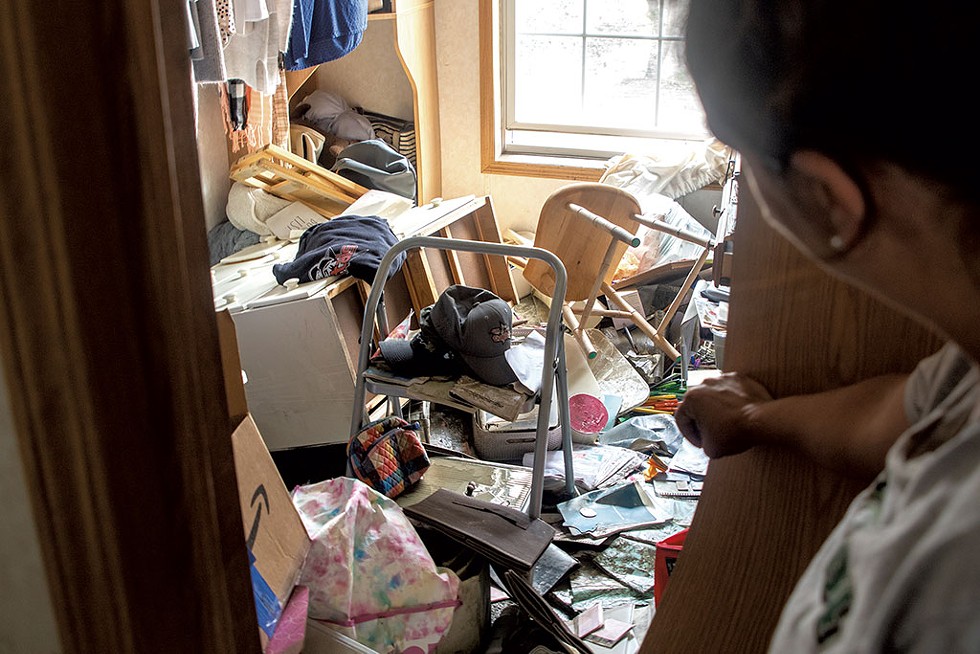

- Colin Flanders ©️ Seven Days
- Addie Wheeler peers into a room in her flood-damaged mobile home
The flood that sent them fleeing the Berlin Mobile Home Park four days earlier had plastered the floors of their double-wide home with mud, tipped over their refrigerator, soaked their couch, and warped their record and DVD collection. The cream-colored mobile home was a wedding gift from Thompson's father, who lived next door. The couple had moved in just five weeks ago. Now, their newly decorated den looked as if it had been shaken by an earthquake. They would never live there again, that much seemed clear, but perhaps they could salvage something. They lingered outside, wide-eyed and at a loss for where to begin.
It wasn't just the size of the cleanup effort that paralyzed them. Like many of their neighbors who had also become homeless overnight, they had no idea whether they needed to wait for someone official to confirm what they suspected — that their homes were totaled — before they could start throwing stuff out. They worried that a wrong decision now could cost them down the road.
Meanwhile, their toilet was unusable, their water was undrinkable and the temperature was close to 90 degrees. Bitter thoughts crept in. A few miles away in flood-struck downtown Montpelier, volunteers were grilling food, handing out water bottles and pitching in on cleanups. And here the couple were, in one of the area's poorer neighborhoods, and not a helping hand in sight?
Andrews thought he knew why: "Nobody gives a fuck about a trailer park."
click to enlarge 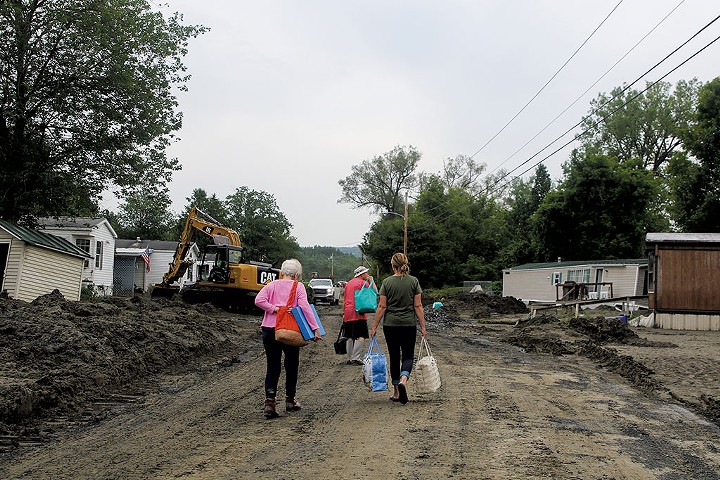

- Colin Flanders ©️ Seven Days
- Residents walking down the muddy road toward their cars
The waters that swamped the Berlin Mobile Home Park drove home an old truth about floods: The people left in their grimy backwash are often those who can't afford to live on safer ground. In the days that followed the July 10 flood, the scale of the destruction revealed itself trailer by trailer, through soggy floorboards and sediment-caked keepsakes. Families had lost their homes and nearly everything in them. There might be some financial relief, in time, if they correctly navigated the finicky bureaucracies of governments and insurance companies.
But "recovery" — a term the TV people were using to pronounce what came next — was hard to picture through disbelief and layers of mud. What was the way forward? As residents sifted, cussed, cried and waited, they confronted a feeling that they were more or less on their own to answer that question.
Andrews stepped off the porch and approached his father-in-law, Earl Thompson, whose own home was so trashed that he had been unable to even step inside. The 76-year-old cashed out his Roth IRA to purchase a $142,500 mobile home for his daughter and her husband. He liked the idea of having her nearby and figured real estate was a safe investment. "Unfortunately, I didn't buy in the right spot," he said.
Just then, a pickup truck pulled up in front of the couple's driveway. Out hopped Michael Bilodeau, who introduced himself as a local mobile home dealer. Bilodeau expressed sympathy for their losses and explained that he buys flooded mobile homes for a modest sum — usually between $2,000 and $4,000 — and takes responsibility for removing them. He sells homes, too, such as one on a corner lot in Williamstown for $189,000, he told Andrews and Thompson. "Just an option," he said.
Twelve years ago, Bilodeau was early on the scene at nearby Weston's Mobile Home Park when it was struck by Tropical Storm Irene. He went on to buy up most of the flood-damaged homes there, he said, "rehabbing" many to flip or rent out in the mobile home parks he owns in central and southern Vermont.
Bilodeau started to take down Thompson's phone number but stopped to flag down a passing car to repeat his pitch. While he was out of earshot, Thompson grinned. "I guess people come out of the woodwork," he said. He shook his head. "Somebody's gonna benefit, but it ain't going to be us."
There was nothing inherently wrong about what Bilodeau was doing. The mobile homes, should they be deemed total losses, would need to be removed. The longer that took, he noted, the more it would cost their owners. The Berlin park residents own their mobile homes but must pay a monthly rent of $490 for their lots — whether or not their homes are habitable. What Bilodeau failed to mention was that some of those who sold their homes too quickly a dozen years ago ran into problems recouping their losses from the Federal Emergency Management Agency.
"People call me a scavenger or an ambulance chaser," Bilodeau said from the cab of his truck. "Call me what you want, but somebody's gotta deal with the house." He left confident that he'd scoop up plenty of the sodden homes.
"I'll get every one I left my card on," he said.
Fleeing to Higher Ground
The 32 homes that make up the Berlin Mobile Home Park are arranged like a zipper along a dead-end road that can be reached only by crossing a bridge over the Stevens Branch of the Winooski River, off Route 302 between Montpelier and Barre. The park is easy to miss, and some locals don't even know it's there.
Families with young children, middle-aged couples and single elderly women count among its residents. Some have lived there for decades. Most have modest incomes, and many have chronic health issues.
The Stevens Branch has been a threat since the park opened in the mid-1960s, but water has never risen higher than the skirts around the mobile homes. That's why, as word spread of last week's coming storm, residents weren't too concerned.
Some began to have second thoughts when Berlin police officers showed up around noon on July 10 to suggest evacuating. You'd hate to get stuck on the wrong side of a flooded bridge, they said. Addie and Alex Wheeler, whose young son, Ben, has type 1 diabetes, decided to leave; they could not afford to be cut off from medical care. But others stuck around.
click to enlarge 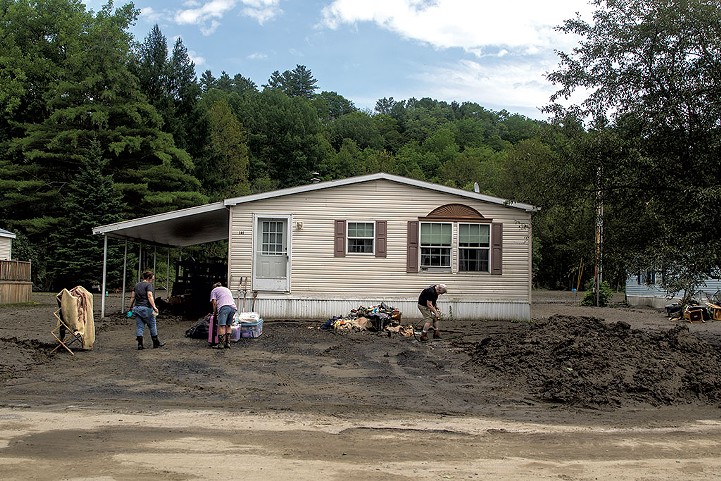

- Colin Flanders ©️ Seven Days
- Marie Thompson (left) and her father, Earl (right), starting to clean up
A few hours later, a woman in the mobile home closest to the stream began calling her neighbors to warn them that the water was rising — fast.
Up the road, Andrews and Thompson were watching television when someone pounded on their door around 4 or 5 p.m. It was a local firefighter. Time to go, he said.
They grabbed a set of clothes, jumped in their cars and took off for higher ground. They and some of their neighbors slept in their cars in the Walmart parking lot a couple of miles away. Others stayed with family or friends or landed in pop-up shelters. Two residents stayed behind and had to be evacuated by swift-water rescue teams.
One woman who found shelter elsewhere stayed up nearly all night watching feeds from the cameras she had installed outside her home. She thought she could see that water had not reached the skirt around the base of her neighbor's home by 4 a.m., so she went to sleep hopeful. But when she saw drone footage of the area the following morning, her optimism evaporated.
The park was underwater.
An Unhappy Return
The floodwaters gradually receded on July 11, and by the following morning, Wednesday, the park had become a muddy wasteland. The park's owner, Randy Rouleau, who lives on a hill that looks down on the park, arrived to watch in the hot sun as excavators worked to clear at least a foot of mud from the access road.
Rouleau, 65, was born and raised in Barre and owns several other parks in the area. The much smaller River Run Mobile Home Park, located about a mile and a half down the road, also suffered damage, and it was unclear what would happen to the seven homes there. The bigger park's future was equally in peril. Its infrastructure — water pipes, sewage system — remained intact, but the homes themselves seemed likely to be total losses.
Rouleau himself has only so much control, he said, since he owns the land but not the homes. "There's a good chance a lot of these homes may not be any good," he said. But what ultimately happens to them will depend on how much "ambition" people have, he said, and how determined they are to fix them up.
Despite urgings that they stay away until the road was cleared, some residents began trickling back to the park on Wednesday. It was hard to blame them. Left behind in the hasty exit were medications, family heirlooms, a tuxedo for an upcoming wedding, even pets.
The excavators halted repeatedly over the next two days to allow residents to pass by. One family had to lug their prefabricated steps a dozen yards back to their front door. Another man piled stuff onto a sled that he dragged over the mud. Some residents left so filthy that they had to line their car seats with garbage bags.
Addie Wheeler had already been back to the park twice by the time she and her son arrived on Thursday morning. When she had first visited on Tuesday, she was forced to wade through waist-deep water to get to her home, where she found the family's bunny, Maple, hiding under the bed, covered in kerosene. She returned on Wednesday with a checklist of essential items, including son Ben's baseball jersey; he had an all-star game that night. She brought the boy this third time in hopes that pitching in on the salvage job might help him deal with losing the only home he had ever known.
click to enlarge 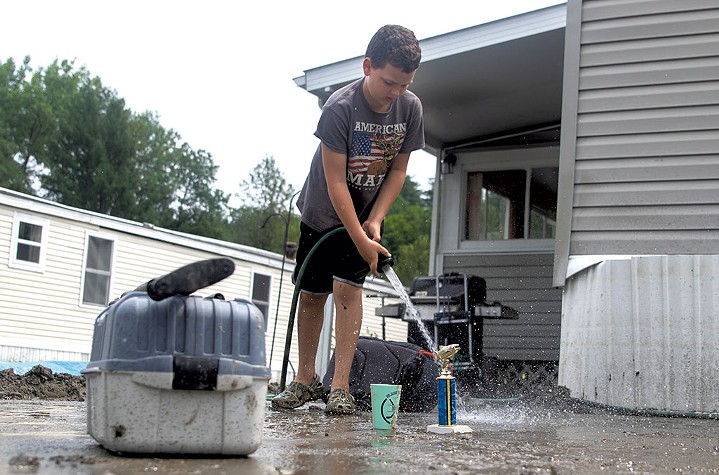

- Colin Flanders ©️ Seven Days
- Ben Wheeler, 10, spraying mud off his bass fishing trophy
Ten-year-old Ben seemed in decent spirits, all things considered. He stood in the driveway with a hose, dousing his muddy John Deere tractor replicas, then his tackle box, the one he used to plop down next to the same stream to fish in the evenings with his dad. Next were his Nerf guns and sports trophies. He handled the one with the bass on top with extra care; he once caught a six-pounder, he said.
As Ben worked, water pooled beneath his camo Crocs and trickled down to the road, where Hattie and Delbert Wood were passing by on their first trip back since the flood. The couple lived with their two grandsons in a home they had owned for 28 years. They had survived other significant floods, including one that struck the year they moved in and prompted their insurance carrier to drop them. The sight of their neighbor spraying off his toys gave them little reason for hope. They smiled at the boy and trudged on, the mud sucking at their boots.
They carefully climbed their porch steps, which had separated from their deck during the flood, then tried the front door. It wouldn't budge. Delbert grumbled, sweat pooling on his brow. He kicked the door. "That won't help," Hattie said gently. A grandson, Steven Griffin, eventually removed a window, climbed into the living room and let them in.
The kitchen was in shambles. Dried cat food and mud covered the windowsills. The rug that once felt so soft under Hattie's feet squished beneath her boots. "Well, this is it," she said, looking around. "Not going to live here again."
Overwhelmed, they gave up any ideas about cleaning up and shifted their focus toward a single task: find Smokey, their cat, who had hidden during the evacuation and was now nowhere in sight.
Hattie searched the kitchen, climbing over the backs of chairs and food containers. She shuffled down a slick hallway, past family photos and a doormat they had hung on the wall, reading "Mimi's Place — There's a lotta spoilin' goin' on here!" She called out the cat's name. Nothing.
They finally found Smokey hiding under a bed, but he dashed out before anyone could grab him. He slid under the soaked recliner, where he climbed up under a wooden plank and refused to move. Griffin had to free him using a crowbar.
As Delbert corralled the terrified cat in blankets, his grandson disappeared into his bedroom. Later, walking back down the muddy road, the 16-year-old took stock of what he had salvaged. His PlayStation, he said, holding up a bag. And, more importantly, he said, reaching into the neck of his T-shirt, was this. He pulled out a black string with a locket, similar to ones that both his grandparents wore. He had left it in his room during the evacuation. Inside it, a bit of his late uncle's ashes.
Facing the Future
click to enlarge 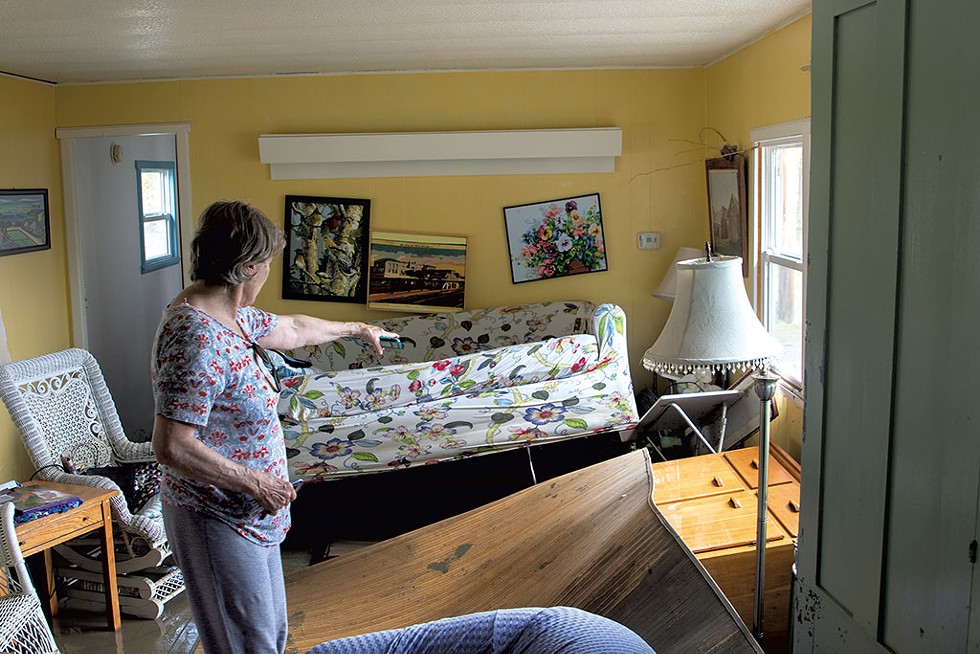

- Colin Flanders ©️ Seven Days
- Anne Giroux pointing out the high water line in her flood-damaged mobile home
By noon on Friday, FEMA had announced that people who lost property or suffered damages from the flood in Washington County would qualify for federal financial help. Kelly Hamshaw, a researcher at the University of Vermont, was at home in Bristol on a monthly conference call with fellow members of a state mobile home housing committee when the news broke. Not long after, her phone rang.
A resident of the Berlin Mobile Home Park who happened to work as an administrative assistant at UVM was on the line. You've got to get over here, the woman told her. Bilodeau's at it again.
Hamshaw knew all about the mobile home dealer's tactics. She recalled people at Weston's Mobile Home Park in the wake of Tropical Storm Irene who struggled to recoup their full FEMA payments after selling before their losses were officially documented. A state report published in 2013 seems to confirm her recollection, noting that some mobile home owners were deemed ineligible for assistance after selling their flood-damaged homes prematurely.
Hamshaw hoped to prevent that from happening again, knowing that some at the Berlin park lacked flood insurance, making federal assistance their best chance to recover some of their losses. She printed informational flyers, grabbed her muck boots and sped off toward the interstate.
The first person Hamshaw encountered at the park was Ronald Chadwick, a 63-year-old man with a bushy gray goatee who lived with his ex-wife. Chadwick sat on the now-crooked porch of his mobile home smoking a cigarette while Hamshaw offered tips on how he could get the most federal relief money possible.
She urged him to take photos of everything, even the serial numbers on his appliances, just in case they got stolen in the night — a problem that cropped up after Irene. She suggested he call 211 to report damage. "That stupid number!" Chadwick groaned. He had already tried to get through to the overwhelmed help center but couldn't. Hamshaw also encouraged him to appeal whatever initial FEMA reward he received, since the feds often had been stingy in their initial offer after Irene.
click to enlarge 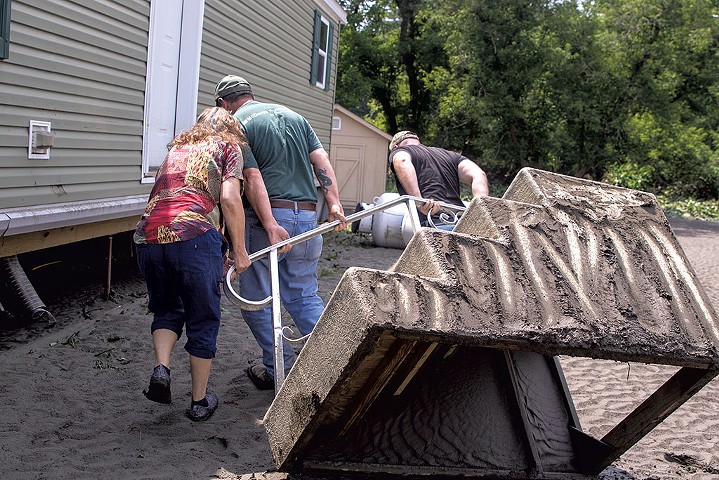

- Colin Flanders ©️ Seven Days
- Kevin and Mary O'Donnell dragging their stairs back to their mobile home with the help of their son
When Hamshaw warned him to be wary of anyone offering to buy his house before FEMA stopped by, Chadwick's eyes lit up. He reached into his pocket, pulled out Bilodeau's card and held it between two fingers.
"He's not getting this house, that guy," Chadwick said. "He could be President Biden and I wouldn't give it to him."
Hamshaw took down Chadwick's contact information, wished him luck and prepared to move on. Chadwick didn't seem quite ready to say goodbye. He kept talking — about the order of frozen food from the Schwan's delivery service that would now go to waste, about where he was staying. His voice trailed off. He buried his face into his hands and cried.
"It's OK, Ronald," Hamshaw said softly. "It's only to be expected."
Hamshaw spent the rest of Friday afternoon going door-to-door. There was only so much she could do; most people had already left for the day. She taped flyers on doors and ripped out Bilodeau's business cards wherever she found them, then headed out, wishing she could have done more.
Later that night, thunderstorms swept through Washington County, the first of several post-flood rainfalls to threaten the area. On Saturday morning, as Andrews and Thompson, the couple who had moved in last month, climbed their porch steps, a flash of white caught their eye. The flyer Hamshaw had left on their door had blown off during the storm and now floated in a puddle, face down. They picked it up, brushed it off and read the parts that were still legible, then set it aside.
At 5:45 a.m. the next morning, Rouleau, the park owner, sent an email notifying residents that he planned to keep the park in operation and that anyone interested in purchasing a new home there could do so through his company or another in the area. He noted other parks he owns that have vacancies.
He urged residents to avoid hasty decisions and encouraged them to talk to a lawyer before selling their homes, as they could be giving up rights to relief money. "This is not a sales pitch," Rouleau wrote. "All we want to do is give good advice to everyone."
The landlord ended the email by confirming that he would continue to charge rent, meaning anyone with a home still on its lot would owe $490, come next month.
See video of the flooded park below:
The original print version of this article was headlined "The Aftermath | In a mobile home park devastated by flood, shock, sadness and frustration take hold"
Got something to say?
Send a letter to the editor
and we'll publish your feedback in print!
Tags: Housing Crisis, Seven Days Aloud, Seven Days Aloud, Seven Days Aloud, Seven Days Aloud, Seven Days Aloud, Seven Days Aloud, Seven Days Aloud, Seven Days Aloud, Seven Days Aloud, Seven Days Aloud, Seven Days Aloud, Seven Days Aloud, Seven Days Aloud, Seven Days Aloud, Seven Days Aloud, 2023 Flood, Berlin, Berlin Mobile Home Park, Seven Days Aloud, Video
About The Author

Colin Flanders
Bio:
Colin Flanders is a political reporter at Seven Days, covering the Statehouse. He previously worked as a reporter at a group of Chittenden County weekly newspapers covering Essex, Milton and Colchester.
Colin Flanders is a political reporter at Seven Days, covering the Statehouse. He previously worked as a reporter at a group of Chittenden County weekly newspapers covering Essex, Milton and Colchester.
More By This Author
Latest in Category
Speaking of...
-

Vermont Communities Tackle Budgets, Bridges and Bonds on Town Meeting Day
Feb 21, 2024 -

After 15 Years and Two Major Floods, Montpelier’s Three Penny Taproom Is Thriving
Jan 30, 2024 -

A Donation to Montpelier's Public Library Repays a Favor From 95 Years Before
Jan 24, 2024 -

Vermont Lawmakers Are Focused on Disaster Response, but Covering the Costs May Be Tough
Jan 10, 2024 -

Backstory: July Flood Hit 'Closest to Home' for Barre-Raised Reporter Courtney Lamdin
Dec 27, 2023 - More »




























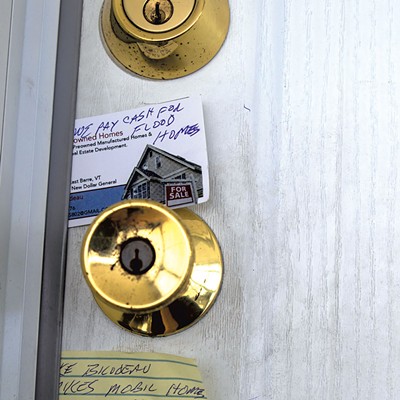
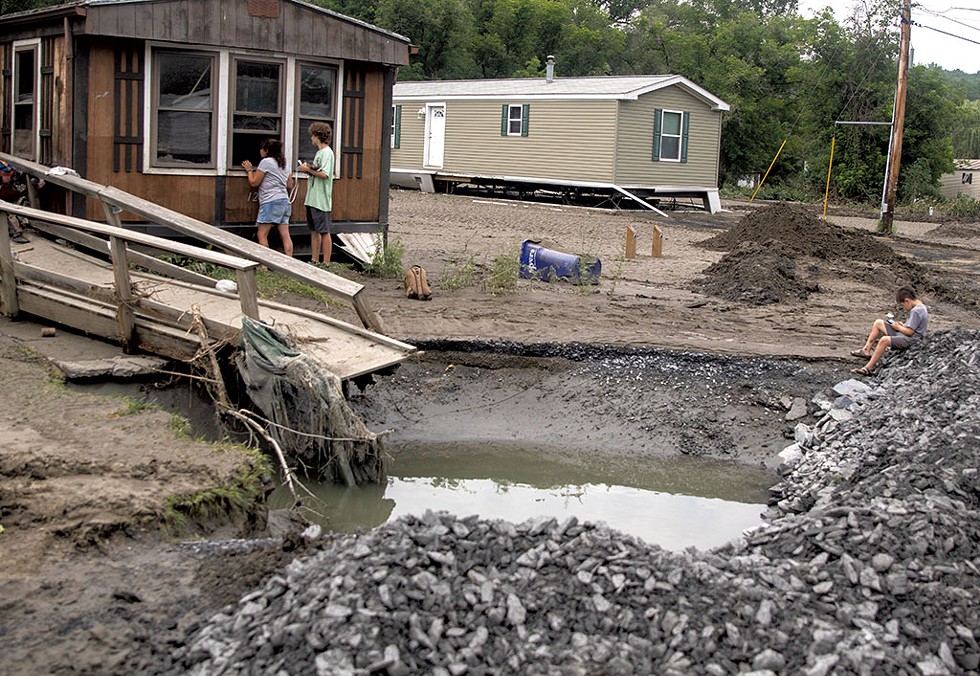
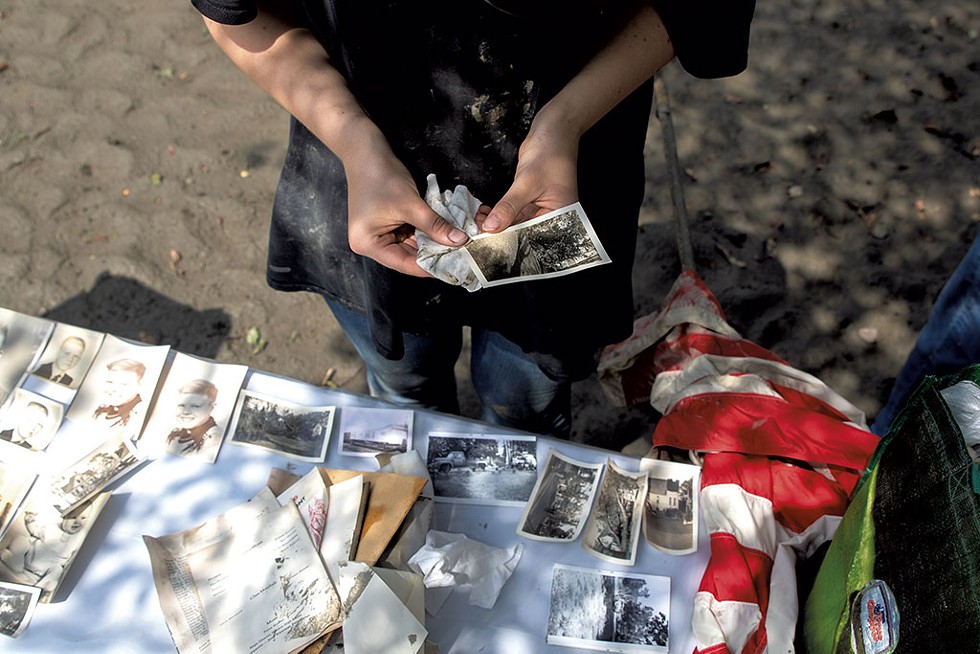



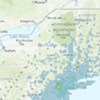



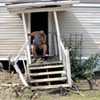


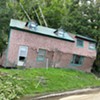
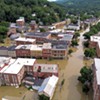

find, follow, fan us: